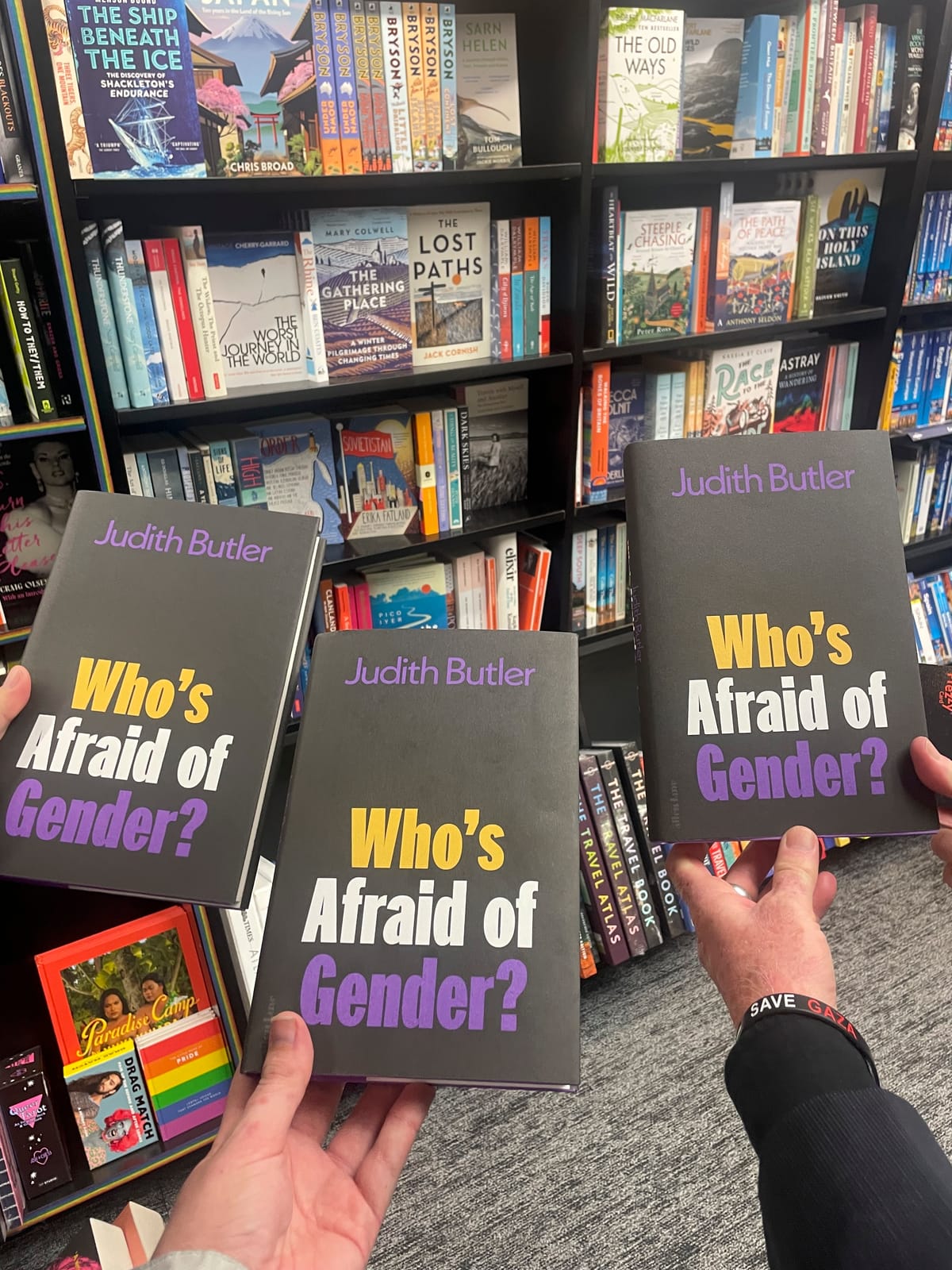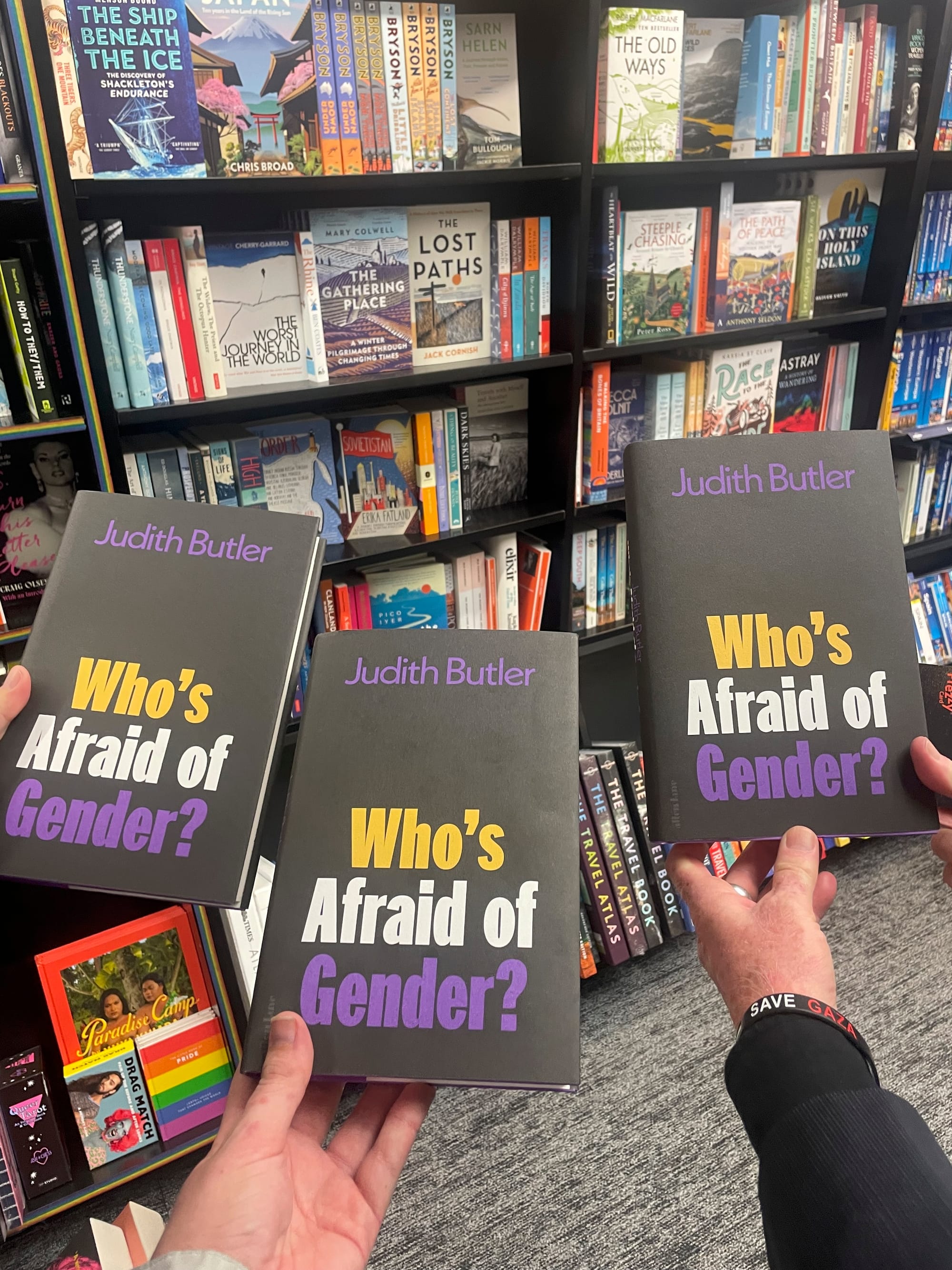NZ First & the phantasm of gender
I don't think this bill was ever intended to pass. While it certainly seems Seymour and Peters have the run of the house, I'm not sure that Peters cares enough about this bill to hold the coalition government in a stranglehold over it. So then, who's afraid of gender?

I picked up Judith Butler's latest book, Who's Afraid of Gender? a month or so ago, right as it came out - I think it was a Teen Vogue interview posted to instagram that caught my eye. In this moment, I genuinely would struggle to think of anyone I want to hear more from about our current moment in time, about gender, about disinformation, about the permacrisis or the polycrisis or whatever you want to call it. They're an icon.
While the NHS continues to fail trans people...
It's been a busy month - right as I started reading, it was all hands on deck when the Cass Review was released. I don't think I need to say much more here, but if you'd like to read more, here's PATHA's statement:
The Review’s recommendations include restricting access to both social transition and gender affirming hormone therapy, and would require the approval of a national multi-disciplinary team for any gender affirming care to be provided to anyone under 18. Restricting access to social transition is restricting gender expression, a natural part of human diversity. Requiring clinical approval for haircuts and wardrobe changes is intrusive, inappropriate, and a waste of money and time.
And here's some excellent reporting from Erin Reed:
Now that the final report is out, it is evident that it was crafted with a predetermined conclusion in mind. The review, highly susceptible to subjectivity, disregarded the body of research on transgender care as not "high quality," a subjective judgment that cannot be trusted as politically unbiased given prior concerns.
Along with an important followup from Reed covering a recent NPR interview in which Cass recommends that we quantify the success of transition by measures such as 'do trans people have jobs' and 'how often do they orgasm':
Should transgender people be judged on their ability to be "employed" or their willingness to "get out of the house," their own discrimination may then be used against their ability to access medication.
And you can find an excellent round up of community and professional responses collated by Ruth Pearce here.
Needless to say, the extent of how troubling Cass' recommendations were, and the influence England unfortunately still has (thanks, colonialism) created a lot of work the world over.
Around the same time, I started watching the back catalogue of Philosophy Tube (Nebula/YouTube) - somehow for the first time? Abigail's previous work on the state of the NHS and their gender service was incredibly eye-opening, particularly after then hearing her on Trashfuture speaking about the impacts of waitlists in the decades - ie, that people die on those lists.
It became super evident that the Cass Review, originally initiated to assess how the NHS' gender service was failing trans people by failing to meet their legal and ethical obligations in terms of actually providing healthcare was not going to address that problem at all, and instead had been significantly influenced by the likes of SEGM and the Florida DeSantis administration.
So, then, Who's Afraid of Gender?

New Zealand First are afraid of gender.
Last week they introduced a not-even-veiled transphobic member's bill aiming to mandate shared, single-sex bathrooms being built in all public buildings and introducing fines for anyone using a bathroom that doesn't "match" their sex. It's a nonsensical bill in many senses of the word - it's entirely unenforceable, would mandate a worse bathroom experience for all (who honestly prefers shared bathrooms over unisex single-stall options), and wouldn't achieve anything it set out to do in Aotearoa.
For one, a quick glance at how bills like this have played out in America make it obvious that rather than keep women safe, they encourage hypervigilance and vigilante violence against anyone that doesn't fit narrow and subjective gender norms - cis women included.
Secondly, the bill is largely drawn from similar legislation from England, which operates in an entirely different context - that is, they don't have self-identification like we have in Aotearoa. Trans people in Aotearoa can easily access legal ID that affirms their gender - we did that already, and it was hard won - and, championed by a NZ First MP.
But I don't think this bill was ever intended to pass. Pre-election, Luxon called this policy platform "from another planet". While it certainly seems Seymour and Peters have the run of the house, I'm not sure that Peters cares enough about this bill to hold the coalition government in a stranglehold over it.
The phantasm of gender
Central to Butler's book is the notion of the phantasm, a philosophical concept that describes a way of viewing the world, in which one's own feelings - fear, most often - become reality. In Abigail Thorne's latest video, The Most Misunderstood Philosopher in the World, she uses a prism to illustrate this point - reality is refracted through the prism of the phantasm for those caught in it, their fears and feelings shaping their material reality.
A phantasm is a form of cognitive dissonance, a way of maintaining internal coherence when the world - and the evidence - challenges your beliefs. Who's Afraid of Gender? - and Thorne's video, which delves into Butler's body of work, contextualises it in a trans-specific context, and is an incredible piece of work in itself - is such important and powerful analysis when we keep asking ourselves the question: how do we get people out of the disinformation rabbit hole?
Because the rabbit hole is another way to describe the phantasm, the mother-of-all-conspiracies that collects every anxiety and fear and points it in one direction - recently, covid vaccines; now, gender.
As I'm sure many of us have experienced, those far down the rabbit hole are so thoroughly caught in the phantasm that they can feel unreachable. Attempts to reach out and connect can feel like you're reasoning with a brick wall, as every point has some counterpoint, some lore that explains away every flaw in the phantasm. Butler points out that many caught in the phantasm resolutely refuse to engage with any of the academic literature around gender, as even listening poses a threat.
Thorne puts it succinctly: "It's not just that they're not listening, it's that when they're invited to listen, it feels like they're under attack."
The phantasm goes beyond cognitive dissonance and functions as a coping mechanism, too. The power of the phantasm is in how it collects disparate and often contradictory fears and gives them an answer. As Butler and Thorne point out, in some parts of the world 'gender ideology' is being pushed by an all-powerful cabal of trans communists - in others, it's hypercapitalism. In some Western countries, it's the liberal agenda - in parts of Europe, it's refugees and migrants from Africa that are importing gender and threatening the future of the (white) nation.
That all these supposed root causes contradict each other isn't a flaw in the phantasm, it's a feature. It allows evangelical Christians, feminists, white nationalists, Nazis, all to gather against what they perceive to be a common enemy - whether gender comes from threats against womanhood or whiteness or Catholicism is of no matter, no matter how much it may contradict - what matters is that gender is the enemy, and that it's as much of a threat to humanity (and God, apparently) as nuclear warfare.
The phantasm contains all these contradictions, and does away with the anxiety - and mental load - that consciously thinking through these fears and their sources would cause.
And the phantasm escalates these fears and feelings to new heights - if gender is an all-powerful threat to humanity, if it's assailing us from all sides, then people like Brian Tamaki feel - and through the phantasm, the feeling becomes reality - that it's right to announce that it's "time to kill".
Why now?
One suggestion as to why NZ First have now introduced this bill is as a distraction from exactly how well this coalition is tracking (that is, not well). And it's not not a distraction - rather, it's not just a distraction.
Because the phantasm is so effective at drawing disparate anxieties and aiming them at a common enemy, it's become a powerful tool for shifting the blame. Because we have a lot to be anxious and fearful of at the moment - the whole world does.
Thorne nails it in her video - all of these things the anti-gender movement are worried about have causes, and a shockingly large amount of them can be traced back to the same cause: the structures of capitalism.
"The anti-gender phantasm is an attempt to criticise the effects of capitalism without naming capitalism as the problem."
The NZ First bill comes at a time when the whole country is in a cost of living crisis that doesn't look like it will resolve any time soon. The public is becoming more and more aware of the growing wealth division, and increasingly aware that the actions of our government so far don't look like they will fix it - don't even look like they're trying to fix it. We're witnessing genocide in real time. We're experiencing the effects of unmitigated and unadapted climate change first hand. We're worried for ourselves, for our whānau, for our children, for our futures and their futures.
It's a lot of worry for a government to hold, particularly for a government who seem particularly invested in increasing profits for themselves and their mates.
But if people are preoccupied with the phantasm of gender...
"People see the bad results of the system that we have, but they're invested in those same systems, so the solutions become unthinkable."
The NZ First bill isn't just a distraction, and it isn't just an attempt to import a culture war because Peters thinks it'll win him points. The phantasm is a powerful political tool - not necessarily because it wins elections, not in Aotearoa, not yet at least. It's a powerful political tool because if people are focusing their attention and their fear and their anger on 'gender ideology' then they aren't focusing their attention on the true causes of the things that are causing their fear and anger and worry.
The bill isn't a one-time distraction from what the coalition of chaos are up to - it's an attempt to import a strategy that has worked incredibly well for governments under pressure in the UK and the USA.
If people are preoccupied with the phantasm of gender, then business as usual can continue. The rich can continue to profit from a dying earth, can continue to profit from a genocide, can continue to profit from the suffering of the majority.
It's not just in trans people's interests to fight back against the phantasm, against calls to eradicate 'gender ideology' from schools, from public life. It's not just in the interest of our allies, or even in the interests of everyone else who will be harmed by anti-gender movements. Naming the true cause of the harm and destruction the phantasm lays at the feet of gender is in the interests of humanity, and of our planet.